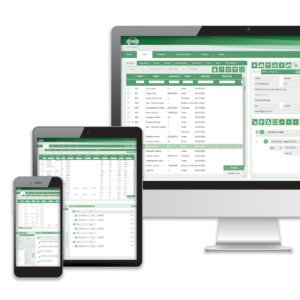While “the cloud” may sound like a nebulous term to some, it’s becoming much more critical in the day-to-day operations of businesses around the world, including retail. In fact, according to businessinsider.com, the amount of business software running on traditional, on-site servers shrank to 32% of all enterprise applications heading into the current year. With more and more businesses making the complete switch to cloud-based applications, it’s important to know the basics, benefits and cloud-based software systems that are available for your business.
To aid retailers in understanding what’s entailed in making the switch, FCNews spoke with four software companies to help explain what cloud-based software and technology is and how it can be a huge advantage to your business.
ABCs of cloud-based software

“‘Cloud-based’ is a popular buzzword right now,” said Chad Ogden, president, QFloors. “So software companies use it for marketing purposes because they know that it’s appealing and communicates remote access and other benefits.”
However, according to Ogden, “cloud-based” is a very broad term that covers a host of different products. While he does specify that running a software application that is not running on one’s own computer or own personal network is considered cloud-based, there are various ways to do so.
To break it down in simple terms, Ogden explained three categories of software:
• On-prem, installed software
Software installed and run locally on your own computer or on your company’s own network.
• On-prem software hosted on the Cloud
An installed, on-prem software program that is accessed through a network hosted by a third-party through the cloud.
• SAS (software as a service) or browser-based software
A software program that is built to be accessed through, and run within, an internet browser. It can be accessed wherever and whenever, as long as you’re using a device with an internet connection.
QFloors is the company’s on-prem, installed software while QPro is the company’s online, browser-based software. “QFloors and QPro, although created by the same company—and offering many of the same features—do not share any common code between them, because the technologies are so different,” Ogden explained.
Benefits of cloud software

Seamless operation. The greatest advantage of cloud-based software, proponents say, is the technological backbone and software itself is managed by the same provider. That’s according to Bob Noe, president, Pacific Solutions, who argues that many servers are not properly configured or maintained—which can lead to degraded software performance. However, when the software provider and hardware provider are one and the same, Noe said it mitigates this common issue for business owners. “What this means for the end-user is a seamless experience, where the servers are configured so the software can perform optimally,” Noe explained.
Utilizing remote desktop technology, Pacific Solutions software has been cloud accessible for years and is designed to function securely and quickly, according to Noe. However, the company didn’t stop there. To achieve the goal of having the option to run the entire application through a web browser, Noe shared that portions of the software have been redesigned to run in a web browser and continue to be enhanced today.
Always up-to-date. Another reason to make the switch from on-prem installed software to cloud-based is overall peace of mind, according to Rahul Karadi, director of sales, western region, RFMS. With cloud-based software, user data is hosted remotely—meaning that it’s regularly backed up and kept secure. Karadi also added that the software’s version is kept up-to-date, which in turn, eliminates the need to pay local IT to manage an in-house server and infrastructure for a company’s data.
“Unfortunately, all too often we get a call from a client whose data is not cloud-based and they’ve had their on-prem server compromised and generally their backups are, too,” Karadi explained. “This creates an incredibly stressful and costly situation that could have been easily avoided by being cloud-based. In these circumstances it’s a toss-up if the data can be restored and if it can be, how good is the content. In most cases, the backups were not being done properly let alone at all. The downtime and internal costs to get things back up and running can typically run into the tens of thousands of dollars.”
In the seven years since RFMS has provided cloud solutions for clients, it has yet to have a customer experience data loss, according to Karadi. This cloud solution works for all sizes of companies and will grow with a company without the need for a financial investment from the client for in-house server infrastructure upgrades.
Overall convenience. Flexibility and ease-of-use is another main advantage that cloud-based software can bring, according to Edgar Aya, CEO, Comp-U-Floor. Every single aspect of Comp-U-Floor’s software is cloud-based, a process in which Aya said took years to complete. Users can access this technology via smartphones, ipads, laptop, etc., at any time and are no longer limited to relying on a server connection.
“Cloud-based software is the next generation of software development,” Aya said. “It allows our users to more effectively use and learn the software. The fact that they can use it from a mobile device, at the warehouse, at the office [or] at home—and be able to run their business—is an incredible advantage that did not exist in previous years.”

